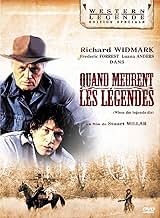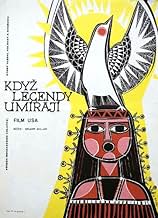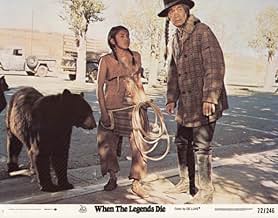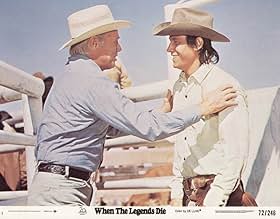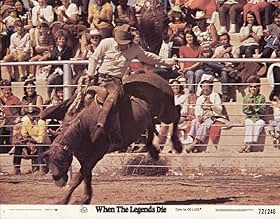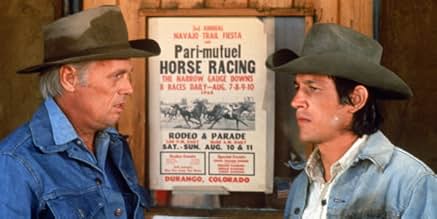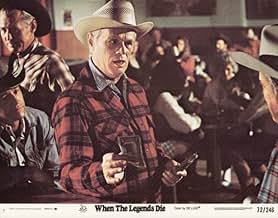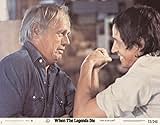एक युवा, विद्रोही भारतीय घुड़सवारी में शामिल हो जाता है और उसे एक शराबी संरक्षक मिलता है जो उसे इस क्षेत्र और दुनिया के तरीके सिखाता है.एक युवा, विद्रोही भारतीय घुड़सवारी में शामिल हो जाता है और उसे एक शराबी संरक्षक मिलता है जो उसे इस क्षेत्र और दुनिया के तरीके सिखाता है.एक युवा, विद्रोही भारतीय घुड़सवारी में शामिल हो जाता है और उसे एक शराबी संरक्षक मिलता है जो उसे इस क्षेत्र और दुनिया के तरीके सिखाता है.
- पुरस्कार
- कुल 1 नामांकन
फ़ीचर्ड समीक्षाएं
Perhaps the best of the "aging rodeo cowboy" movies that mysteriously began to appear in 71-72 (Cliff Robertson's "J.W. Coop," Steve Inhat's "The Honkers" with James Coburn, and Sam Peckinpah's "Junior Bonner" with Steve McQueen). What makes the difference is Richard Widmark who seems more appropriately cast than the stars of the rival rodeo films. Widmark is excellent in perhaps the best of his later period roles.
I sent for a video of a film I fondly remember from more than 30 years ago, but was surprised that Widmark's role as the drunken, exploitative Red was relatively small. Forrest was never better than in his first starring role; presumably, despite his name, he is a Native American, and his riding skills cannot be wholly have been usurped by stunt riders. Anyway, he is excellent, as is the gloriously non-PC Widmark. But there are gaps in the story which I hope to fill by at long last reading the novel. I'm not sure that 'no animals were hurt in the making of this picture' - I was distressed when 'brother bear' was driven into the wilderness, and despite Tom's alleged love of horses his reputation as 'killer seems well deserved - but hey, the women hardly fare better. A film of its time, then, but well worth preserving.
As the great cowboy stars of the fifties hit middle age, every other film in 1972 seemed to be about an aging rodeo star. This is probably one of the best of that short-lived genre thanks to Richard Widmark's obvious pleasure to be playing a nice guy for once.
In the War Wagon, Howard Keel who plays Levi Walking Bear, derides his fellow Indians constantly saying how he's learned to live in the white man's world and beat him at his own game. When the Legends Die is a film about a contemporary Ute Indian who tries to do just that and the effect it has on him.
Fredric Forrest plays Thomas Black Bull, a young Ute who we first meet as a really backward kid, no education or social skills. After he sees him riding a bucking horse, old rodeo hand Richard Widmark takes him on as a protégé and young Mr. Black Bull becomes a champion saddle bronco rider.
It's a profession and skill that he is beating the white man at his own game and making some good money in the process. It offends his sense of honor though, when Widmark now asks him to lose a few contests to make the odds better when he rides for real. It's the start of a break in their relationship.
Fredric Forrest has had a strange career. When the Legends Die was his third film after two bit roles, this one gave him the billing of "introducing Fredric Forrest." This was the start of a whole bunch of times when good reviews prompted critics to say that Forrest was about to break out and become a big star. It never really happened for him though. Nevertheless his stoic performance as Thomas Black Bull turning into Killer Tom Black is accomplished a lot with some very good closeups on facial expressions. They say more than dialog with a good player.
Richard Widmark plays Red Dillon, the old rodeo cowboy who becomes Forrest's manager/trainer. A whole lot like the way Robert Mitchum takes on young Arthur Kennedy in The Lusty Men. But we have a far bigger cultural and generational gap than there was in The Lusty Men. Despite his good old boy upbringing, Widmark develops a real affection for Forrest so their break up is pretty painful on both sides. Widmark in his performance as Dillon shows a seamier side of rodeo than other films about the sport never have. Of course Mr. Widmark shows it with style.
The film is about how Thomas Black Bull resolves all the conflicts within him. If you see the film I think you'll agree he does it in the best way any of us could.
This review is dedicated to young Ryan Dirteater of the Cherokee nation in Oklahoma and fast rising star of the Professional Bull Riders. Let Ryan avoid the pitfalls that Frederic Forrest has in this film.
Fredric Forrest plays Thomas Black Bull, a young Ute who we first meet as a really backward kid, no education or social skills. After he sees him riding a bucking horse, old rodeo hand Richard Widmark takes him on as a protégé and young Mr. Black Bull becomes a champion saddle bronco rider.
It's a profession and skill that he is beating the white man at his own game and making some good money in the process. It offends his sense of honor though, when Widmark now asks him to lose a few contests to make the odds better when he rides for real. It's the start of a break in their relationship.
Fredric Forrest has had a strange career. When the Legends Die was his third film after two bit roles, this one gave him the billing of "introducing Fredric Forrest." This was the start of a whole bunch of times when good reviews prompted critics to say that Forrest was about to break out and become a big star. It never really happened for him though. Nevertheless his stoic performance as Thomas Black Bull turning into Killer Tom Black is accomplished a lot with some very good closeups on facial expressions. They say more than dialog with a good player.
Richard Widmark plays Red Dillon, the old rodeo cowboy who becomes Forrest's manager/trainer. A whole lot like the way Robert Mitchum takes on young Arthur Kennedy in The Lusty Men. But we have a far bigger cultural and generational gap than there was in The Lusty Men. Despite his good old boy upbringing, Widmark develops a real affection for Forrest so their break up is pretty painful on both sides. Widmark in his performance as Dillon shows a seamier side of rodeo than other films about the sport never have. Of course Mr. Widmark shows it with style.
The film is about how Thomas Black Bull resolves all the conflicts within him. If you see the film I think you'll agree he does it in the best way any of us could.
This review is dedicated to young Ryan Dirteater of the Cherokee nation in Oklahoma and fast rising star of the Professional Bull Riders. Let Ryan avoid the pitfalls that Frederic Forrest has in this film.
Widmark plays the drunken, former rodeo rider to perfection, & Frederick Forrest does admirably as the put upon young bull rider. I felt most of the other players were of the Grade B variety, as was this production in many ways. Not as good as "J.W. Coop".
क्या आपको पता है
- ट्रिवियाBased on the book of the same title.
- भाव
"Killer" Tom Black Bull: Where's Meo?
Red Dillon: Dead. Yep, he just come in here one night and said he was gonna die. The next morning he was dead. So I buried the old chili-eater out back there.
- क्रेज़ी क्रेडिटThe 20th Century Fox logo plays without the fanfare.
- कनेक्शनReferenced in My Husband, the Producer (1974)
- साउंडट्रैकWhen You Speak to the Kids
Lyrics by Bo Goldman
Music by Glenn Paxton
Sung by Freddie Hart and Kenni Husky
टॉप पसंद
रेटिंग देने के लिए साइन-इन करें और वैयक्तिकृत सुझावों के लिए वॉचलिस्ट करें
- How long is When the Legends Die?Alexa द्वारा संचालित
विवरण
- रिलीज़ की तारीख़
- कंट्री ऑफ़ ओरिजिन
- भाषा
- इस रूप में भी जाना जाता है
- The Taming of Tom Black Bull
- फ़िल्माने की जगहें
- Bayfield, कालोराडो, संयुक्त राज्य अमेरिका(The rodeo scene, the bar/main street scene, the house fire and the homecoming parade were all filmed in Bayfield, Colorado)
- उत्पादन कंपनियां
- IMDbPro पर और कंपनी क्रेडिट देखें
बॉक्स ऑफ़िस
- US और कनाडा में सकल
- $5,59,088
- चलने की अवधि1 घंटा 47 मिनट
- रंग
- पक्ष अनुपात
- 1.85 : 1
इस पेज में योगदान दें
किसी बदलाव का सुझाव दें या अनुपलब्ध कॉन्टेंट जोड़ें


